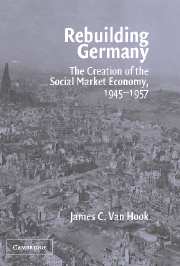Book contents
- Frontmatter
- Contents
- Preface
- List of Abbreviations
- Introduction
- 1 Planning for Reconstruction
- 2 The Future of the Ruhr: Socialization, Decartelization, Restoration, 1945–48
- 3 High Hopes and Disappointment: The SPD and the Planning Regime 1945–47
- 4 Ludwig Erhard, the CDU, and the Free Market
- 5 Free Markets, Investment, and the Ruhr: The Korean War Crisis
- 6 The Social Market Economy and Competition
- Conclusion
- Bibliography
- Index
Conclusion
Published online by Cambridge University Press: 18 August 2009
- Frontmatter
- Contents
- Preface
- List of Abbreviations
- Introduction
- 1 Planning for Reconstruction
- 2 The Future of the Ruhr: Socialization, Decartelization, Restoration, 1945–48
- 3 High Hopes and Disappointment: The SPD and the Planning Regime 1945–47
- 4 Ludwig Erhard, the CDU, and the Free Market
- 5 Free Markets, Investment, and the Ruhr: The Korean War Crisis
- 6 The Social Market Economy and Competition
- Conclusion
- Bibliography
- Index
Summary
The year 1957 marks a convenient end point for a study of the introduction of the social market economy. The anticartel law passed that year, though disappointing to many of its supporters, nevertheless represented the ideological foundation for the social market economy. After all, the idea of a social market had gained prominence within the context of postwar debates about how best to address the problematic legacies of German economic and industrial history. To the neoliberal economists who supported Erhard, the great problem of German history had been a level of organization that sapped not just the economic potential of the individual, but the meaning of individuality in German politics and culture as well. The high levels of cartelization evident during the Wilhelmine era and the Weimar Republic had represented the economic manifestation of a nefarious “cult of the colossal.” Within the context of the occupation, when Allies and German administrators attempted unsuccessfully to cope with the legacy of National Socialist “collectivist” organizations, social market theorists made the argument that a market economy maintained by a strong state could better achieve the social ends deemed essential in the twentieth century. The free competitive order that the anticartel law of 1957 aspired to establish gave meaning to the word social in the term social market economy.
Today, the term social market economy is well-nigh synonymous with the European welfare state.
- Type
- Chapter
- Information
- Rebuilding GermanyThe Creation of the Social Market Economy, 1945–1957, pp. 291 - 296Publisher: Cambridge University PressPrint publication year: 2004

